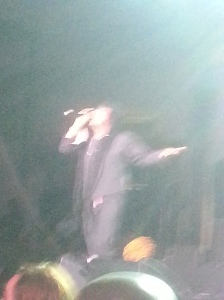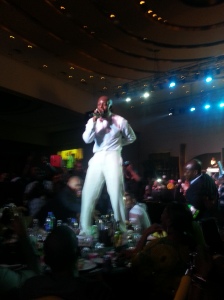It has now been widely reported that IBAN* and BON** (associations of independent television and radio broadcasters) have chosen, in response to lawsuits by COSON, seeking the payment of royalties for its members, to stop playing the music of COSON-registered artists. Here are a few bits and bobs on collecting societies and royalty payments.
- What is a Collecting Society?
A collecting society is an organisation that, as the name suggests, collects royalties income on behalf of its members. What income? Well, you’d have to go back to Copyright 102, on who owns the music, for copyright basics. However, to quickly summarise, the music and the process through which it is made confers exploitable rights on different people. If you’re a busy song writer or a touring singer, the chances are that you cannot track all the stores, radio and tv stations, digital platforms, etc. playing or selling your music. Collecting societies do this for their members. Examples of collecting societies outside Nigeria are The Harry Fox Agency, PRS for Music, ASCAP, NORM, SAMRO and so on. In Nigeria, we have COSON – the Copyright Society of Nigeria. COSON is the collecting society for musical works and sound recordings in Nigeria. What are musical works and sound recordings? See Copyright 101.
2. Does COSON represent only singers/artists?
In theory, no. I reckon COSON would also argue that it doesn’t just represent singers in practice. In theory, COSON should represent and indeed holds itself out to represent everyone in the music-making process – singers, writers, instrumentalists, producers and so on. However, the nature of copyright is such that if a producer or instrumentalist was hired and paid a one-off fee for their work, it is deemed a work-for-hire and copyright vests in the employer. Which brings me to the “in theory” part, because in Nigeria, most singers write their own songs and the producer (hired and paid a one-off fee) sequences the music with software. After Cobhams, not too many others hire session bassists, guitarists, percussionists, etc., unless you’re part of a fuji or highlife band, but you get the drift. If a singer who’s written his own music (or his label), hires a producer (on a one-off fee) who lays the beats, who owns the copyright in the work? The artist? That’s right. But I am more than happy to be corrected if my assessment is wrong.
3. How do Collecting Societies pay their members?
I’m just going to copy and paste the ASCAP formula . You can find the breakdown and explanation on their webpage, here.
Use Weight X Licensee Weight X “Follow The Dollar Factor” X Time of Day Weight X General Licensing Allocation
+
Radio Feature Premium Credits (for radio performances only where applicable)
+
TV Premium Credits (for performances in highly rated series, where applicable)
=
CREDITS
You can also view BMI’s method here.
How does COSON pay its members? They also describe it on their website and here’s another copy and paste:
“At COSON, there are two categories of distributions: Specific Distribution and General Distribution.
“When a license is issued for a clearly identifiable work or a log is received from which the royalty due to a particular work is clearly discernible (e.g radio & TV promos, road shows, jingles, ringtones, etc), the copyright owner/s is entitled to a royalty based on how much the society has collected on behalf of the owner from the user. The only deduction in this case will be the administrative cost.
On the other hand, a general distribution is made to members across the board, in cases where the royalty collected cannot reasonably be ascribed to any specific work or where the members at an AGM have decided that a token be paid to all members irrespective of the amount of use of their works. General distributions are usually done once in a year.”
4. Is COSON the only collecting society in Nigeria?
Uhm, yes, although Charlie Boy and his friends at MCSN would probably disagree with me. And this article, here, suggests there should be more than one. However, the Copyright Act says that you cannot officially be a collecting society unless the Copyright Commission licenses you as such. The Act goes further to state that that the Copyright Commission does not need to license more than one collecting society if it is satisfied that a single society can carry out the role adequately. Therefore, as the law currently stands, royalties for the broadcast of musical works and sound recordings in Nigeria are payable to COSON alone.
5. Does COSON’s “International Standards” Argument Fly?
COSON prefaces most of its statements on this matter with a reference to international standards and practices for the industry. If we want a world-class industry, then YES, it certainly makes sense for us to adopt the standards that the very best representatives of the international industry have imbibed. However, our history, both economic and political, has shown (and it’s unclear to me whether this is fortuitous or by malevolent design) that wholesale adoption of international standards has not always worked. In his piece on the matter, industry heavyweight, Efe Omorogbe frowns at the BON/IBAN tack of wanting to develop a system that takes the “peculiarities of the Nigerian industry” into cognisance. Obviously, given how long BON and IBAN have contended with collecting societies (and other, more sinister motives, as alleged by COSON), there are some trust/credibility issues. But there is nothing wrong (if BON/IBAN are sincere) with looking at the roles that culture, environment, etc. played in the evolution of international systems while they were evolving, and see if we need to tweak any parts of what we’re adopting. For instance, is it a factor worth considering that in the royalty regimes practising these international standards, pirates and piracy are not as pervasive as they are here? Is it worth considering that our traditional channels for distribution now involve an Alaba “distributor” negotiating a one-off fee with the artist and the artist expecting no more sales income from the album (thank God for digital)? These have no direct bearing on radio and television per se, but they underscore the point that our industry is neither American nor British – it is Nigerian.
Clearly, BON and IBAN have to pay for licences to exploit the music, unless they all decide to become 100% talk radio stations. This is more so as they are required to have 80% Nigerian content. If their ban is as a result of not wanting to pay at all, it is unconscionable. If, on the other hand, they want to develop a royalties regime in good faith for the Nigerian industry, then rather than merely complaining about antagonism and harassment, they should be putting out counter-proposals to COSON’s. Eventually, the law suits that have been filed by COSON will reach a conclusion and things will come to a head. It will be interesting to see if the ban will last as long as the lawsuits.
________________________________________________________
**IBAN – Independent Broadcasting Association of Nigeria
**BON – Broadcasting Organisations of Nigeria
Related articles
- Nigerian Music Royalties Battle: COSON vs BON and IBAN [full details] (alisthive.wordpress.com)
- @naijamusiccity: True Reasons Why Iban/bon Ban Nigerian Music on Radio and Tv @cosonng (naijamusiccity.wordpress.com)
- Go to hell – 2face, eLDee, 9ice, MI, others refuse to be threatened by TV & radio stations (READ) (bestnewstalk.wordpress.com)
- Cracking Digital Music in Nigeria
- The COSON Summit on Digital Licensing
- A Summary of the Nigerian Law of Copyright











